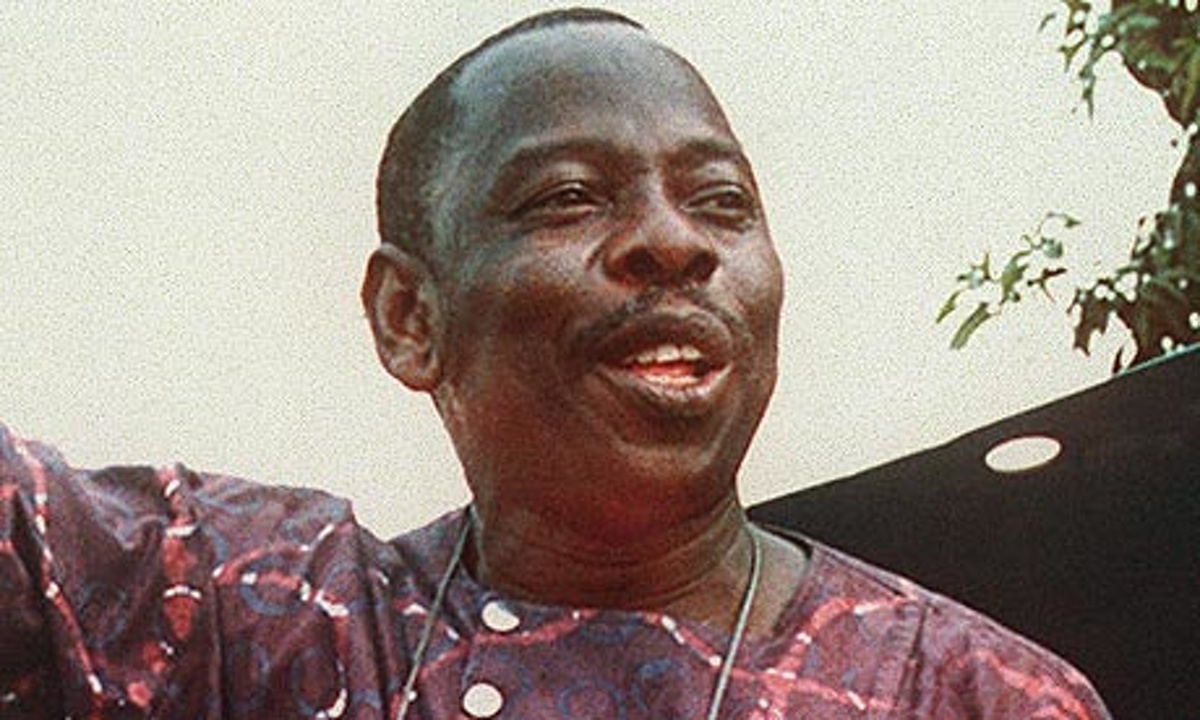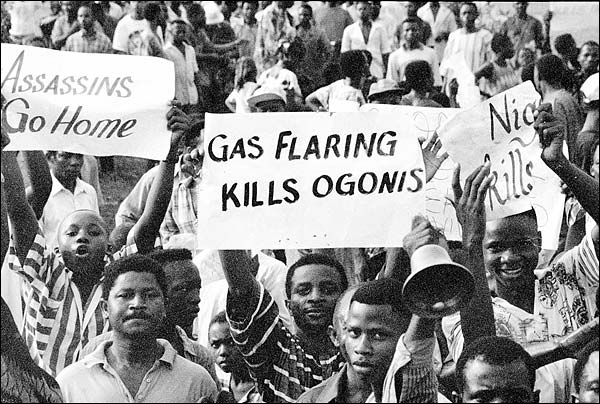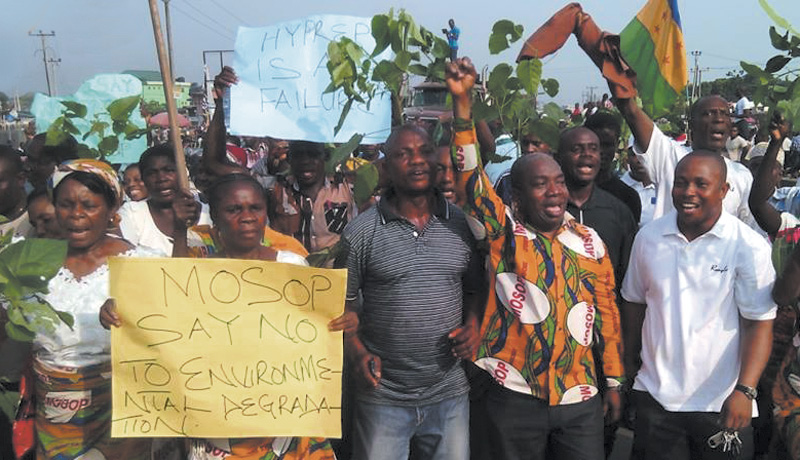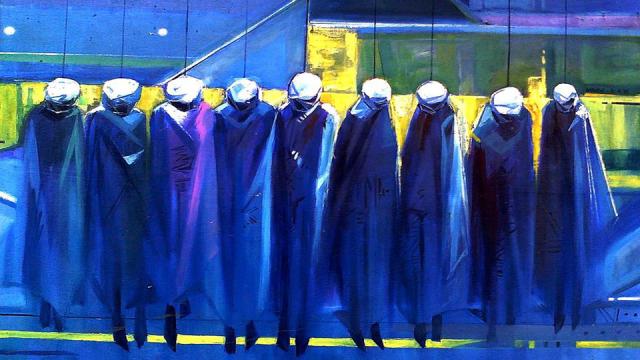
On Nov. 10, it will be 20 years since Ken Saro-Wiwa, president of the Movement for the Survival of the Ogoni People (MOSOP), and eight other Ogoni leaders were hanged by the military dictatorship in Nigeria. Known as the Ogoni Nine, their crime was demanding a share of the proceeds of oil exploitation.
The Niger Delta covers a huge area of some 27,000 square miles on Nigeria’s southern coast. Once almost all tropical rainforest, it has one of the highest levels of biodiversity on earth and is home to 31 million people. Ogoniland comprises 400 square miles in the eastern delta.
Shell-BP found oil there in the 1950s and Shell continued to extract oil from the region until MOSOP’s campaign of nonviolent resistance mobilized 300,000 people to demand environmental and social justice and forced the company to stop in 1993. It never returned.
Billions of dollars of profit was made from Ogoni oil but the people were excluded from the economic benefits. Instead their environment, which had sustained traditional livelihoods mainly in agriculture and fishing, was devastated. Spillages of oil were common and children played a stone’s throw away from gas flaring.
In 1995 MOSOP was calling for a cleaner and more humane environment to live in, and a measure of political autonomy for the Ogoni to direct their own affairs. In Nigeria, at the time, asking for autonomy was sacrilege. Giving the Ogoni a share of their oil wealth meant reducing the profits and power of Shell, the main oil company operating in Ogoniland.
Giving the Ogoni any form of autonomy meant questioning the exploitative colonial, political and economic structures bequeathed by the British. Such demands had to be repressed – and they were, brutally so.
From Writer to Environmentalist
Prior to joining MOSOP, Ken Saro-Wiwa was a well-known writer. In the early 1970s he set up Saros International, a publishing company through which he published many poems and novels, most famously Sozaboy, written in pidgin English. He also produced a popular TV drama called Basi and Company. He was able to use his artistic skills to talk about national unity, growth and development. At one point he was the president of the Association of Nigerian Authors.
Saro-Wiwa’s transformation from a writer to an environmentalist was born out of what he saw every day. Nigerian land was rich in resources, yet Nigerian people were poor. He lived in an area where he could clearly see the oil wealth being stolen daily from under people’s feet. At the same time there was abject poverty and deprivation.
He became a key player in MOSOP, which at the time was an elite Ogoni group. As an executive member and later president, he transformed it into a mass-based people’s rights organisation, recognised and supported throughout the Ogoni people.
Ogoni Bill of Rights
Saro-Wiwa was deeply involved in crafting the Ogoni Bill of Rights. Published in 1990, this document captured the economic, cultural and political aspirations of the Ogoni people, providing a road map for an Ogoni nation where people had the right to control their own resources. Saro-Wiwa believed firmly that the oil in the Niger Delta was a resource that belonged to the Nigerian people, not international oil companies.
The Bill of Rights asserts that the Ogoni people have a right to live in an environment that is safe and productive, a right they continue to fight for. It was a call to action to the people of Nigeria to reject the British imposition of a colonial structure. The Ogoni sought political autonomy, to be represented in all Nigerian institutions as an Ogoni nation, a distinct ethnic nationality, rather than a state or region dominated by others.
This bold demand was a direct threat to Shell as autonomy would give the Ogoni the power to decide if Shell should be allowed to continue to exploit Ogoni oil. It was this call for self‑determination that led Shell and the Nigerian government to see Ken Saro-Wiwa as a threat and led to the execution of the Ogoni Nine.
The Ogoni Nine
When four Ogoni elders were attacked by a mob and killed, the Nigerian regime accused nine members of MOSOP of committing the murder. Ken Saro-Wiwa and the others – Saturday Dobee, Nordu Eawo, Daniel Gbooko, Paul Levera, Felix Nuate, Baribor Bera, Barinem Kiobel and John Kpuine – were nowhere near at the time and always maintained their innocence. Two chief prosecution witnesses later testified that they had been bribed to give evidence.
On Nov. 10, 1995, the nine were hanged. It was the Nigerian regime that executed the Ogoni Nine, but it is clear Shell also bore responsibility. As Ken Wiwa, Saro-Wiwa’s son, explains, "Shell could have stopped it at any time they wanted to, they have that kind of power in Nigeria. Shell basically encouraged state violence against the Ogoni people, and eventually against my father. Okay, they didn’t tie the noose around my father’s neck, but without Shell’s intervention and encouraging of the military government it would never have happened."
History often raises certain figures over others, but the Ogoni Nine were equal in this struggle. They were all formidable characters and here in Nigeria we recognise them equally. We attribute every single achievement to all of them. They made the same sacrifice as Ken; they were all hanged together.
The repression didn’t stop with the murder of Saro-Wiwa and his comrades. The government set up the Rivers State Internal Security Task Force, a fierce crack team of policemen, soldiers, the navy and airforce with the single duty of uprooting dissent. Its chairman boasted that he had a manual with one thousand ways to kill that he was implementing in Ogoniland. Military checkpoints were hurriedly erected all over Ogoni areas. Everyone suspected of being a member of MOSOP was arrested and detained. Many were never seen again. Women were raped, properties looted, whole communities were torched. Those who could find their way out of Ogoniland went into exile.
Justice for the Ogoni
Twenty years after those dark days, the formal state reprisals may have abated, but justice has still not been done in Ogoniland.
Despite oil extraction ceasing in 1993, oil pollution continues to devastate local communities. This is due to inadequate remediation of historic oil spills, and also because of new, ongoing spills from oil infrastructure and pipelines and the failure of Shell to decommission wells. Repeated spills by Shell and other oil companies have made the Niger Delta one of the most polluted places on earth. More oil has spilled from the delta’s network of terminals, pipes, pumping stations and oil platforms than in the 2011 Gulf of Mexico oil spill.
The traditional occupations of farming and fishing are no longer possible in Ogoniland. Despite the fact that the Niger Delta is the largest wetland in Africa, the Ogoni people consume contaminated water containing known cancer-causing agents in lethal proportions.
Ogoniland remains one of the most deprived places in Nigeria. The few schools look like they belong in the 18th century. The roads are bad and medical care almost non-existent. The only "general hospital" in Bori, the capital of Ogoniland, can hardly be called a hospital. To have a minor medical procedure, people must provide their own power generator. The majority of the people still live in inadequate houses, partly exposed to the weather, because there has never been a scheme for public housing.
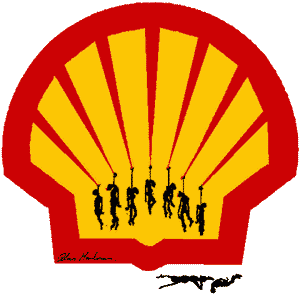 Take on the Devil
Take on the Devil
In 2011 the United Nations Environment Programme (UNEP) released a report that confirmed scientifically what people in Ogoniland already knew: that the environment was unproductive and unsafe for human habitation. UNEP concluded that restoring the Ogoni environment could take 30 years in the most challenging environmental remediation exercise ever attempted.
The UNEP report recommended that $1 billion should be allocated to set up an environmental restoration fund and begin the clean up. But in the four years since the report was published Shell and the Nigerian government have failed to implement its recommendations.
The Nigerian state and Shell thought that if they killed Ken Saro-Wiwa and his comrades the struggle would be over. But instead their blood watered the seeds of the revolution in Ogoniland. Not one drop of oil has been drilled in Ogoniland for more than 20 years. The Ogoni Bill of Rights still provides a road map for the Ogoni people: using a proportion of our oil wealth to rebuild our society is a fundamental demand.
The work of Ken Saro-Wiwa and his comrades has inspired ethnic nationalities across the world, showing that it is possible to stand up against a multinational oil company. In all our struggles the message was simple: take on the devil without losing your moral belief in the tools of nonviolence. Ken Saro-Wiwa’s life is a lasting testament to the power of nonviolence, the power of resistance, the power of people.
3 WAYS TO SHOW YOUR SUPPORT
- Log in to post comments

